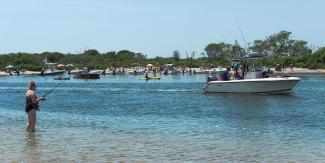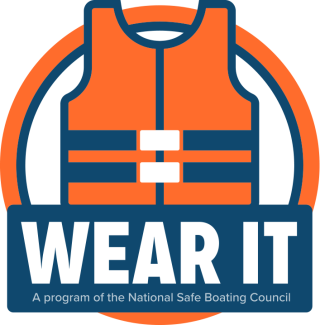Boating & Fishing Safety


Wearing a life jacket while paddling in Rhode Island is no longer optional
The “mandatory personal flotation device (PDF) wear for all paddle craft” rule is one of five new safety regulations written to save lives. Violations could result in the imposition of a $100 ticket. The PFD regulation states that all operators and passengers of canoes, kayaks, sailboards, kiteboards, paddleboards, and any other paddle craft must always wear a United States Coast Guard (USCG)-approved PFD while underway regardless of age.
Another new regulation that could prevent injuries and save lives is a restriction prohibiting anyone from riding on the bow of a powerboat unless it’s equipped with bow seats designed to accommodate passengers or from hanging their feet and legs over the top of the gunwale anywhere on the boat while underway. Another new rule requires boaters to slow down and move over when emergency vessels — such as Coast Guard, firefighting, harbormaster, and DEM boats – are within 300 feet of the boater and have their emergency lights activated. A fourth regulation requires all fire extinguishers on boats to abide by their age expiration date. Typically, the date of manufacture is printed on the bottom of the fire extinguisher. The last new reg relates to engine cut-off switch compliance. Specifically, the captain of a recreational boat that’s 26 feet long or less that’s equipped with an engine cut-off switch must use the switch if the boat is “on plane or above displacement speed.” Displacement speed is the speed at which the wavelength of a vessel’s bow wave is equal to the waterline length of a vessel. As boat speed increases, the wavelength of the bow wave also increases.
Read more
For information on Rhode Island boating laws, click here.
Boating Safety Certification
WHO NEEDS TO BE CERTIFIED:
- You were born after January 1, 1986
- You will be operating a personal watercraft (jet ski), regardless of age and regardless of residency
Non-residents operating a vessel (other than a personal watercraft-see above), you must meet the requirements of your home state to operate in Rhode Island waters. For questions, contact DEM/Environmental Police at 401-222-3070.
If you live in another state and operate your vessel on Rhode Island waters for more than ninety days in a calendar year, you will need the boating certificate. If you operate in Rhode Island waters less than 90 days, you only need to meet the requirements of your state to operate in Rhode Island, except all operators of personal watercraft (jet skis) need a RI boating safety certificate.
- Mandatory Boating Safety Education: Information About the Law
- Lost your card? Request a Boating Card Replacement
Learn more about getting a boating safety card
Fishing in Cold Waters
Even on a warm day, water temperatures can linger in the low to mid-50s in cooler months. According to a U.S. Coast Guard report, a boating accident is five times more likely to be fatal if the water is colder than 60 degrees. Using small, unstable vessels like canoes and kayaks in water that's deceivingly cold puts anglers in a very dangerous situation.
According to the U.S. Coast Guard Safety Division, victims who experience an unexpected fall overboard suffer initial cold-water shock in the first minute, which involuntarily causes them to take a series of big breaths, called hyperventilation. If their head is underwater, they can inhale more than a quart of water and drown immediately. People lucky enough to keep their head above water will continue hyperventilating as their blood pressure jumps. If they can't control their breathing within 60 seconds, they'll suffer numbness, muscle weakness or even fainting, which leads to drowning. A person with heart disease may experience sudden death due to cardiac arrest.
A victim who survives the first minute of cold shock and hyperventilation will progress to the second stage, called "cold incapacitation" or swimming failure. Within about 10 minutes, rapid cooling of the extremities causes muscle stiffening so a person will no longer be able to perform the simplest tasks, such as swimming, holding onto a floating object, or putting on a life jacket. Even yelling for help can be difficult.
Hypothermia is the third stage. There is a common misconception that it sets in almost immediately after a person lands in cold water. However, a victim won't start to become hypothermic for 30 minutes. Severe hypothermia can take an hour or more to set in, depending on the water temperature, body mass, clothing, the amount of struggling, and other factors. A body core temperature of 95 degrees is considered hypothermic, loss of consciousness occurs at about 86 degrees, and death is imminent when the core temperature drops below 82. Unless a person is wearing a life jacket, drowning will occur long before severe hypothermia sets in.
Boating safety education has helped reduce boating accidents in Rhode Island, and it is the law. In Rhode Island, successful completion of a boating safety course is required for all boaters born after January 1, 1986, who operate a boat with a motor greater than 10 horsepower; and regardless of age for all operators of personal watercraft (jet ski). For information on classroom courses or to access DEM's free online course, visit dem.ri.gov/safeboating.
High Surf Alerts
Rhode Island often experiences needless tragedy during storms when wave-watchers or anglers who have climbed onto rocks near the shore get hit by waves, are quickly swept out to deep water, and drown. Along with some anglers, "storm watchers" put themselves in danger by standing too close to the surf on rocks along the shoreline in fishing areas, breakwalls, and breachways. Stay safe by remaining far away from areas where waves might splash over. Waves possess enormous force and can easily sweep a person into the water from what seems to be a safe viewing area. Get the latest surf forecast here.
